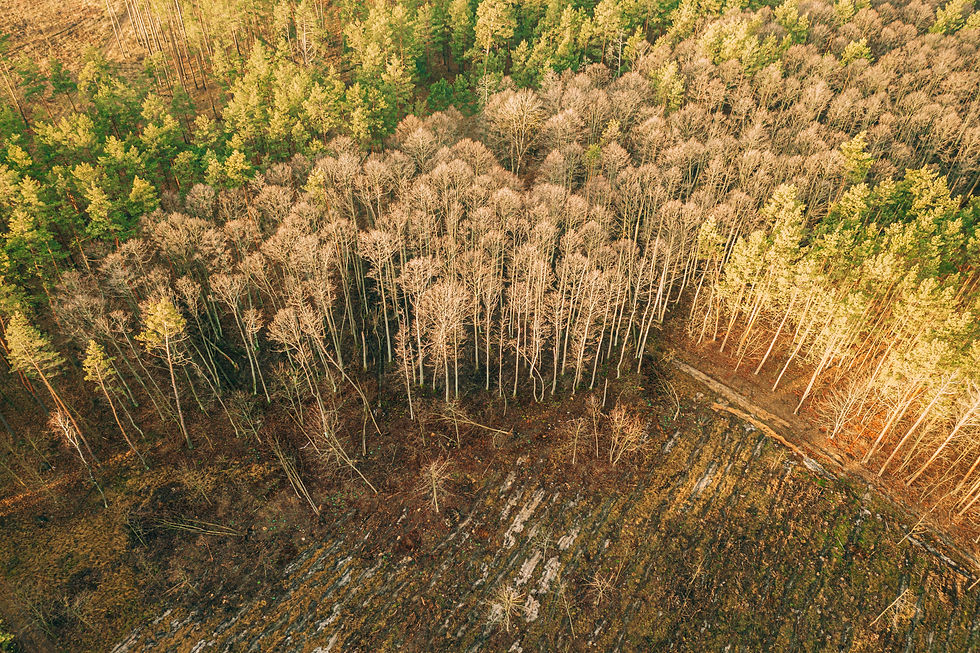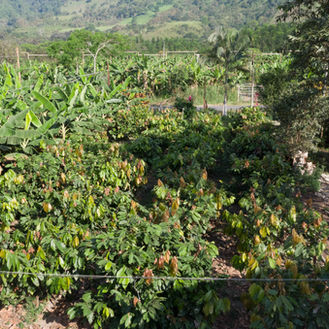EU Parliament Rejection of Country Risk Classification Benchmarking Framework Sparks Global Uncertainty for Businesses Navigating EUDR Compliance
- Gusi Ayu Putri Chandrika Sari

- Jul 10, 2025
- 6 min read
Updated: Jul 11, 2025
Editor’s note:
This article explores the implications of the European Parliament’s rejection of the EUDR country-risk benchmarking framework and what it means for global supply chains. Featuring insights from KOLTIVA’s Senior Manager for Agriculture and Environment, Andre Mawardhi, it highlights the urgent need for science-based reform and inclusive compliance systems. As enforcement deadlines draw near, the call for data accuracy, regional nuance, and smallholder inclusion has never been more critical.
Executive Summaries
The European Parliament has rejected the proposed EUDR country-risk benchmarking system, a decision shaking up global trade and compliance efforts.
This system would have classified countries as “low,” “standard,” or “high risk” for deforestation, directly affecting importers of key commodities like palm oil, cocoa, and soy.
Key concerns included the use of outdated data, oversimplified risk categories, and unfair country rankings that overlook local progress and efforts.
As the EUDR enforcement deadline (Dec 2025 for large firms, June 2026 for SMEs) nears, businesses now face urgent uncertainty about compliance expectations.
KOLTIVA emphasizes this as a turning point, calling for a science-based, accurate, and inclusive model that supports both compliance and sustainable trade.
The European Parliament’s rejection of the EU Commission’s proposed country-risk benchmarking system under the Deforestation Regulation (EUDR) marks a pivotal moment for global supply chains. On July 9, 2025, the Parliament voted 373 to 289 against the framework—sending a strong signal with far-reaching implications for regulators, importers, NGOs, and sustainability-driven businesses.
The benchmarking framework was intended to classify countries as low, standard, or high risk for deforestation. These classifications would have shaped the level of due diligence required for EU importers of seven key commodities: cocoa, coffee, palm oil, soy, wood, rubber, and cattle.
Critics raised serious concerns about the system’s credibility. They argued that it relied on outdated data and failed to account for current realities on the ground, including legality issues as well as ongoing deforestation and forest degradation. As ESG Today reported, the proposed model risked unfairly labeling countries as high-risk despite recent sustainability progress.
Table of Index:
With the December 2025 enforcement deadline approaching, the rejection leaves exporters, importers, and smallholder networks facing renewed uncertainty—even as many have made significant efforts to build traceable and deforestation-free supply chains.
In response, KOLTIVA, a global leader in sustainable sourcing solutions, is advocating for a reformed, science-based approach grounded in data accuracy, supply chain transparency, and inclusive support for smallholders.
The urgency is undeniable. Forests are vital to tackling the interconnected crises of climate change, biodiversity loss, and ecosystem degradation. Yet in 2023 alone, the world lost nearly 16 million acres of forest—an area larger than West Virginia—according to the 2024 Forest Declaration Assessment (WWF, 2024). Agriculture accounts for more than 49% of tropical deforestation, while mining, logging, and infrastructure expansion continue to intensify the threat (World Resources Institute) The Forest Declaration Assessment further warns that deforestation levels remain nearly 50% above the reduction path required to meet global 2030 targets.
As EUDR compliance efforts continue, the need for credible, up-to-date country risk classification systems—and for collaborative, data-driven solutions—has never been more urgent.

What the Parliament Rejected EUDR Country Risk Classification—and Why It Matters
Originally, The European Commission’s proposed country-risk benchmarking system under the EU Deforestation Regulation (EUDR) aimed to categorize all countries as “low,” “standard,” or “high risk” for deforestation. This classification would determine the level of due diligence required by EU importers of key commodities like palm oil, cocoa, and soy.
On July 9, 2025, the European Parliament voted 373 to 289 to reject the proposal, citing the following key concerns:
Outdated data sources
The framework relied on historical land-use statistics that do not reflect recent efforts or current realities. Critics, particularly from the European People’s Party (EPP), called for science-based, real-time assessments rather than static classifications (ESG Today, 2025).
Risk tiers lack credibility
The inclusion of only three risk categories – low, standard, and high risk – by the EUDR was “insufficient to adequately differentiate between countries with vastly different levels of deforestation risk (ESG Today, 2025).
Misleading classifications of key countries
Despite ongoing deforestation, countries like Brazil, Indonesia, and the Democratic Republic of the Congo (DRC) were labeled only as “standard risk.” Meanwhile, only Belarus, Russia, Myanmar, and North Korea were listed as “high risk.” These rankings raised credibility issues, as highlighted by Politico Europe (Politico.eu, 2025).
Although the vote is non-binding, it sends a strong political signal. It urges the European Commission to revise the benchmarking approach to better reflect local conditions, promote data accuracy, and rebuild trust across global trade systems

Implications for Global Supply Chains and Compliance
While the EUDR’s first enforcement deadline approaches—December 30, 2025 for large companies and June 2026 for SMEs—businesses across the supply chain face fresh uncertainty. This timely feature includes insights from our Senior Manager Agriculture & Environment, Andre Mawardhi, ahead of the EUDR enforcement deadline in December 2025.
Andre said, “One of the most critical oversights in the initial proposal was the absence of legality indicators. Under the EUDR, products must be both deforestation-free and legally compliant. If the European Commission proposes a new version, it will likely be more stringent. This decision acknowledges the growing concern across supply chains that risk classifications must be based on current data and clear, evidence-based distinctions. At KOLTIVA, we see potential reforms as an opportunity to strengthen the EUDR’s credibility and better support sustainable sourcing efforts.”
He added, “This issue goes beyond regulatory definitions. An inaccurate classification system risks unintentionally penalizing compliant businesses. A more refined, data-driven model is essential to safeguard responsible supply chains and ensure the regulation meets its intended objectives.”
Andre further emphasized, “Ultimately, this discussion is not only about technical risk categories. It also has serious implications for smallholders who may face exclusion from EU markets despite meeting all compliance requirements—simply due to outdated or inaccurate data.”
Countdown to EUDR Compliance: Industry Needs Clarity
Despite the Parliament’s rejection, the EUDR is still scheduled to take effect in two waves:
December 30, 2025: Compliance required for large companies
June 2026: Compliance extended to SMEs
The regulation’s enforcement will require companies to prove that commodities placed on the EU market are not linked to deforestation or forest degradation after 2020, and that they are sourced legally.
Without an updated benchmarking system in place, companies are left guessing what level of due diligence will be expected—and where to focus their resources.
KOLTIVA’s Perspective: A Call for Reform and Data Accuracy
The European Parliament’s rejection of the EUDR benchmarking framework may represent a political pause, but it also opens a crucial window for reform. Now is the time to build a more credible, inclusive, and data-driven system—one that honors smallholder contributions, provides legal certainty to importers, and safeguards the world’s remaining forests.
KOLTIVA stands ready. In collaboration with businesses, enterprises, MSMEs, supply chain actors, and civil society organizations, we are actively supporting the design of a more precise and equitable model. Through transparent regional analysis, traceable sourcing technologies, and farmer empowerment initiatives, we’re working to help shape an EUDR framework rooted in both integrity and impact.
As Andre Mawardhi concludes: “This moment is a crossroads. With a stronger, more credible benchmarking system, we can align policies, responsible commerce, and rural development behind a truly deforestation-free future.”
While the EUDR is a landmark regulation, its success hinges on implementation that reflects the complex reality of how commodities are produced and traded.
“The EUDR is a groundbreaking regulation. But if implementation ignores the reality of how commodities are grown and traded, it risks undermining its own impact,” said Mawardhi. “The good news is—we have a chance to course correct. Let’s build a smarter, fairer system that rewards integrity, not just geography.”
As regulators, importers, and producers grapple with the road ahead, KOLTIVA is already piloting what works: supply chain traceability precision, and farmer-first systems that bridge compliance with inclusion.
“The EUDR is a powerful idea,” says Mawardhi. “But the tools to implement it fairly and effectively already exist. Let’s use them—before progress becomes paralysis.”
Author: Gusi Ayu Putri Chandrika Sari, Sustainable Communications Specialist
Subject Matter Expert: Andre Mawardhi, Senior Manager Agriculture & Environment at KOLTIVA
About the Expert:
Andre Mawardhi, Andre Mawardhi is the Senior Manager of Agriculture & Environment at KOLTIVA, where he leads sustainable agriculture strategies and environmental compliance across global supply chains. With over a decade of experience in agri-environmental systems, Andre specializes in integrating climate-smart practices, traceability frameworks, and regenerative farming into multi-stakeholder ecosystems. His work bridges scientific insight with on-the-ground impact, ensuring smallholder inclusion and compliance with emerging regulations like the EU Deforestation Regulation (EUDR). Passionate about transforming food systems from the ground up, Andre plays a key role in shaping data-driven, sustainable sourcing solutions that benefit both producers and the planet.
Resources:
Cerulus, L. (2025, July 9). Lawmakers reject EU deforestation risk list. Politico Europe. https://www.politico.eu/article/lawmakers-reject-eu-deforestation-risk-list/
Forest Declaration Assessment Partners. (2024). Forest Declaration Assessment 2024. Forest Declaration. https://www.forestdeclaration.org/resources/forest-declaration-assessment-2024
Harris, N., Payne, O., & Alix Mann, J. (2023, October 24). What's driving forest loss? New data reveals where — and why — deforestation is happening. World Resources Institute. https://www.wri.org/insights/forest-loss-drivers-data-trends
World Wildlife Fund. (n.d.). Deforestation and forest degradation. https://www.worldwildlife.org/threats/deforestation-and-forest-degradation
ESG Today. (2025, July 9). EU lawmakers reject EUDR’s country risk system in new setback to deforestation regulation. https://www.esgtoday.com/eu-lawmakers-reject-eudrs-country-risk-system-in-new-setback-to-deforestation-regulation/
Deforestation Regulation implementation. Green Forum. https://green-forum.ec.europa.eu/nature-and-biodiversity/deforestation-regulation-implementation_en











The Parliament’s rejection signals that the path to EUDR compliance must be more nuanced and science-based. 👏